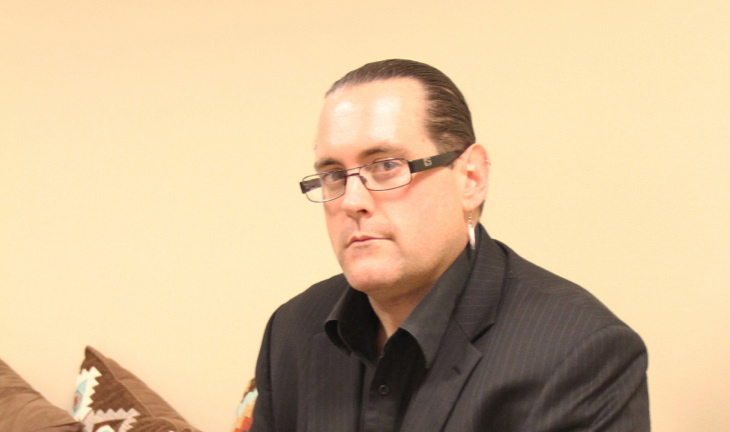WASHINGTON — A self-described “powwow brat,” Joe Sarcinella purposefully approached every step of his Native American dances with care and conviction, learning the grass, hoop and traditional dance steps that are central to the Lakota culture.
But what Joe never imagined is that his Native American culture would lead him to the Pentagon.
Andrew Joseph Sarcinella, 35, is the Senior Advisor and Liaison of Native American Affairs for the U.S. Department of Defense. He reports directly to Office of the Secretary of Defense, making him the top Native American civilian at the Pentagon.
His post involves developing and implementing policy that addresses Native American, Alaska Native and Native Hawaiian concerns. An expert in Indian law, he advises agency officials on issues that affect Native communities and helps mediate negotiations between tribal governments, the Army Corps Of Engineers attorneys and the Office of the Secretary of Defense General Counsel.
“The Department of Defense cares a lot about Indian Country,” said Sarcinella, the go-to guy for tribal affairs. “The whole idea at the Department of Defense now is that they want an ongoing partnership and relationship, so that a consultation isn’t just a thing that just pops up when there’s a problem.”
Historically, the Department of Defense has been an adversary of the tribes, according to a statement released by the National Congress of American Indians, a nonprofit organization that advocates for indigenous rights.
“Along with other agencies directed by executive orders, DOD policies and programs have recently improved to address tribal trust responsibilities and the government-to-government relationship. Joseph Sarcinella’s position was created to facilitate DOD-tribal interaction and has been a positive step forward,” the NCAI statement said.
Sarcinella’s grandmother was Hunkpapa Lakota and First Nations Assiniboine from the Wood Mountain Indian Reserve in Saskatchewan, Canada. His grandfather was Creek.
His father is French and Italian, but his mother immersed Sarcinella and his five siblings in Native culture – and clearly influenced his passion to work with tribal communities.
“My mom, she is one of my greatest heroes – I’m going to get choked up,” Sarcinella said. “She was just very, very selfless in the work that she did. She is very talented. She’s a great performer, which makes her an amazing teacher.
Growing up, Sarcinella’s mother worked for the Boys and Girls Club of America as a national program adviser and trainer, making youth advocacy second nature to him. He served in youth program positions at two branches of the Boys and Girls Club near the Salt River Pima Maricopa Indian Community in Scottsdale and Mesa, Arizona.
True to the Lakota culture, he is humble about awards he has received for past volunteerism, a trait he said his mother ingrained in him as a kid. In college he received the Charles H. Cook Indian Leadership Award from the Native American Community Leadership Program and was awarded two National Program Excellence Awards for his work with the Boys and Girls Club.
“My son went to the Boys and Girls Club over on the Salt River reservation,” said James Riding In, associate professor of American Indian Studies at Arizona State University, where Sarcinella earned a master of justice and social inquiry. “My son and all the other kids just really thought the world of Joe because of his commitment to them.”
Sarcinella had another commitment early on – he loved to cook. So he studied business at California State University-Sacramento to learn what it would take to open his own restaurant.
“When I was little, I used to sit in my grandma’s house on the floor and watch PBS and watch ‘Great Chefs,’ and I was always mesmerized,” Sarcinella said. “Every place I would go and eat, I would systematically deconstruct the plates in front of me. It’s a huge passion of mine, still to this day.”
Even today, he said, he makes a mean plate of fish tacos, fettuccine alfredo, and of course, fry bread.
But after reading about the challenges of running a successful restaurant, he decided cooking might serve him better as a hobby than as a career, setting him on another path: law and public policy.
“I like to argue, and I like social justice, and I wanted to do something that benefited people,” he said. “And I wanted to do something very centered in Indian Country.”
After earning a law degree from ASU and serving in various legal positions within tribal courts, Sarcinella accepted a role in 2011 as a government and legislative associate in the Navajo Nation Washington Office.
Sarcinella is enthusiastic about the work he’s been involved in during his two-year appointment, which ends in February 2015. He manages the Native American Lands Environmental Mitigation Program, which identifies environmental impacts on Indian lands caused by past military activities.
Pat Lauderdale, a professor of justice and social inquiry at ASU who served on Sarcinella’s graduate program committee, said he could sense Sarcinella’s passion for working with Native people right away.
“When he walks down the hallway, it’s like a whirlwind coming,” Lauderdale said. “Even if you didn’t hear him, you could feel it. He was wonderful, just so darn energetic.”
Developing a unified understanding within the Department of Defense on how to approach and build relationships with tribal communities is one of Sarcinella’s top priorities.
But the part of the job that really resonates with him is being the troubleshooter for the tribes.
“Nothing is more fulfilling than saying, ‘Draft this up, have your tribal chairperson sign it, give it to me immediately, and I will put it into the system and get it to the right people, and someone will contact you quickly,” Sarcinella said. “That’s really fulfilling to me – to be that automatic go-to person who can empower the tribe to get their voice heard.”


